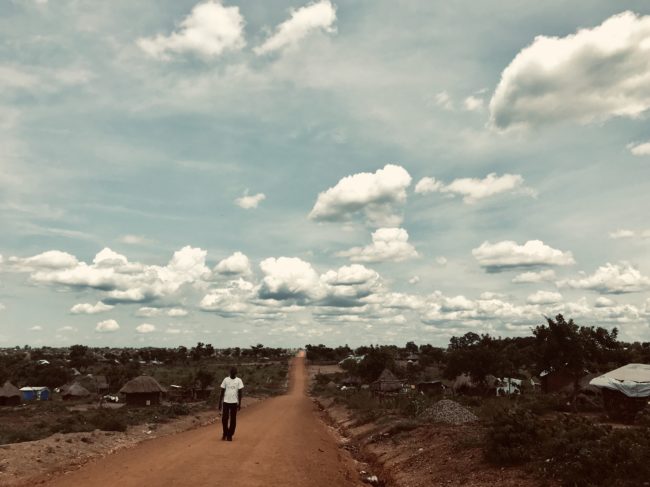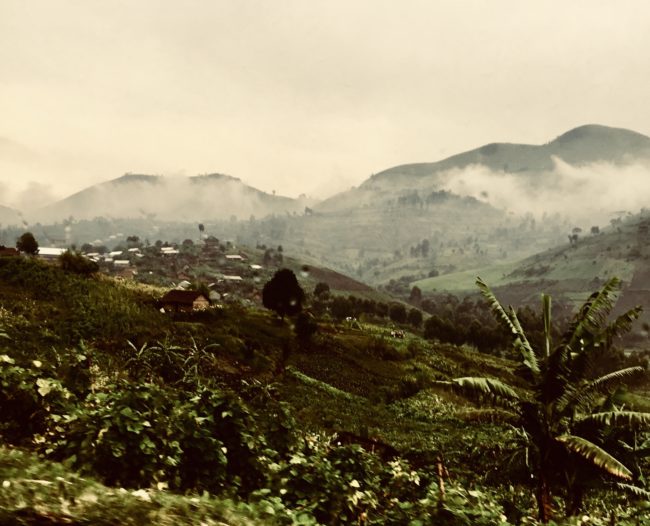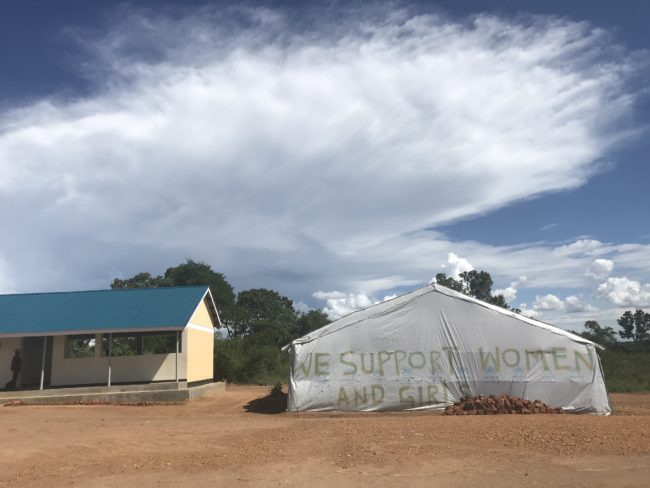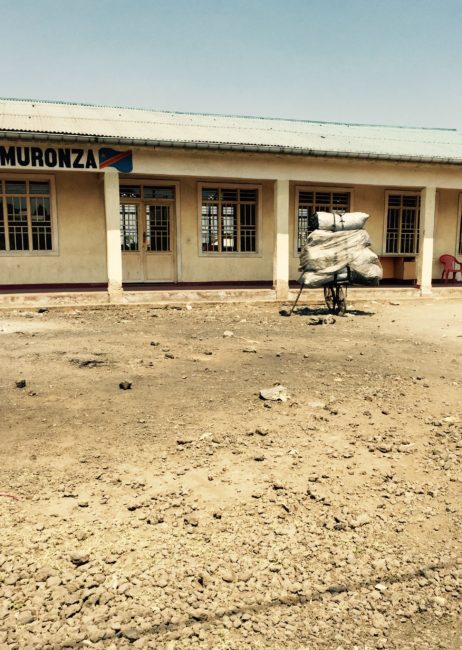Holly is an attorney with a background in international criminal justice and a Senior Legal Analyst for The Sentry, where she leads their efforts to ensure financial investigations support war crimes prosecutions at international, regional, and domestic levels.
Geoffrey Holland: Can you talk about the work of The Enough Project and its closely associated organization, The Sentry?
Holly Dranginis: The Enough Project is a nongovernmental organization based in Washington, D.C. with the aim of supporting peace and an end to mass atrocities in Africa’s deadliest conflict zones. Together with its investigative initiative The Sentry, Enough focuses on understanding and raising awareness about the dynamics among violent kleptocratic regimes, armed groups, and their commercial partners sustained and enriched by corruption, criminal activity, and the trafficking of natural resources. Enough seeks to build leverage in support of peace and good governance through public advocacy and policy influence in the United States and abroad. Enough engages governments and the private sector on potential policy solutions, and mobilizes public campaigns focused on peace, human rights, and breaking the links between war and illicit profit.
The Sentry is an investigative team established to complement Enough’s public advocacy work with forensic investigations and direct engagement with sanctions authorities and law enforcement agencies. The Sentry conducts deep-dive follow-the-money investigations, aiming to create significant financial consequences for kleptocrats, war criminals, and their international collaborators through network sanctions, anti-money laundering measures, prosecutions, compliance action by banks, and other tools of financial pressure. These measures aim to disrupt the profit incentives for mass atrocities and oppression, and create new leverage in support of peace and human rights. Since its launch in 2016, The Sentry has produced reports and converted investigative research into dossiers on individuals and entities connected to grand corruption, violence, or serious human rights abuses. The investigative team has turned those dossiers over to government regulatory and law enforcement agencies in the U.S. and around the world, as well as to officials at the world’s largest banks through which so much of the dirty money flows.
GH: What are rare earth minerals and how do they drive the violence and conflict in the Congo and other parts of Africa?
HD: The Democratic Republic of Congo has been called a geological scandal based on the vast volumes and diversity of lucrative natural resources within its borders. The exploitation of oil, elephant ivory, old growth timber, and rubber have long marked Congo’s historical, social, economic, and political dynamics. Congo also has an abundance of valuable minerals. Tin, tantalum, tungsten, and gold are the four known as “conflict minerals” because they are vital to the production of a range of consumer products, including computers, mobile phones, and jewelry – and they have played a significant role in financing armed groups and government army units responsible for widespread violence against civilians in eastern Congo. A 2003 United Nations report reported on the business exploits of armed groups during the height of violence in eastern Congo, and the close connections between violence and natural resources. A 2004 Human Rights Watch release insisted, “If the international community is serious about curbing conflict and related rights abuses in resource-rich countries, it should insist on greater transparency in government revenues and expenditures and more rigorous enforcement of punitive measures against governments that seek to profit from conflict.” Since then, numerous Congolese and international organizations have continued to illuminate the financing of armed groups and violent state actors as one of numerous complex aspects of violence in the region. Together with others, the Enough Project advocated for resolutions and legislation that would encourage greater scrutiny of and transparency by major companies sourcing these minerals. Part of the purpose of that was to give consumers who wanted to buy ethical products more leverage. Other countries whose populations are faced with extreme corruption and armed conflict are also resource rich: the Central African Republic has lucrative diamond mines, and South Sudan has a valuable timber belt along the southern border and vast oil reserves in its northern states.
More recently, the surge in demand for electric cars has led to a rush for Congo’s cobalt, affecting global markets and the social and economic dynamics in Congo. The majority of the world’s cobalt is concentrated in Congo, meaning many corporate actors are scrambling to find access to source from there, and the profit potential for the Congolese government is massive. Currently, the areas that are rich in cobalt are not experiencing the levels of armed conflict that have occurred where tin, tantalum, tungsten and gold could be found, but repressive military units of the Congolese government have operated illegally in cobalt mines, and child labor has been rampant. The government makes it extremely difficult for local or international watchdog organizations to access the areas, which is a red flag for possible abuses going on in the sector.

GH: Can you talk about the scale of lawlessness and violence in the Eastern part of the Congo?
HD: Impunity for serious crimes has been a consistent backdrop of eastern Congo’s history of armed conflict. For an investigation we released back in 2015, I spent several weeks in Goma and Kinshasa to better understand law enforcement’s approach to natural resource theft, and the project revealed deep flaws in the justice system more broadly. Lack of capacity and resources impede the traction of investigators and prosecutors who are dedicated to accountability. Corruption – including political interference from high levels of government – results in dropped cases or scapegoat targets for serious crimes, especially when evidence leads to high-level political involvement in the commission of crimes. One of the primary problems is that state actors are deeply involved, if not at the forefront, of many of the worst cases of exploitation and violence against civilians. Month after month, year after year, Congolese and international groups like Women’s Synergy, Panzi Hospital, Human Rights Watch, Innovation for the Development and Protection of the Environment, United Nations panels of experts, Amnesty International, and The Sentry document grave abuses and serious violations of international law, yet prosecutions are few and far between.
Our more recent Sentry investigations have shown not only that violent and corrupt actors are deeply involved in natural resource exploitation and corruption, but that they rely on a range of other actors to profit – everything from banks to shipping companies to shell companies and legal service providers. Yet most of this landscape is unscrutinized. Virtually no one in the middle of the supply chains bringing materials to global market faces consequences for complicity in violence. This is the subject of a new report we just released, Prosecute the Profiteers: Following the Money to Support War Crimes Accountability, and my associated article in Just Security.

GH: How does government corruption enable the violent exploitation of high value mineral resources in some African nations?
HD: Government corruption often involves currying favors to the elite, in service to profit and impunity. Relationships between high level political actors, military commanders, bank executives, and real estate tycoons often involve backdoor deals for certain lucrative concessions, cash transfers, or the misappropriation of public funds. As someone we interviewed in Katanga, DRC for our recent cobalt report pointed out, “The copper and cobalt industry in the Democratic Republic of Congo has become ‘a cash cow’ for those in power in Kinshasa and their acolytes.” One of the defining features of how this kind of corruption relates to violence has to do with control over territory, and control over powerful positions. A recent report by a United Nations commission that has been documenting abuses there for several years said the groups responsible for much of the violence there – including rape and torture – are bankrolled by oil revenues.
GH: How do foreign banks and corporate interests figure into the resource conflicts in Africa?
HD: Financial pressure tools like anti-money laundering measures, banking regulation, and network sanctions are often used to combat drug trafficking and nuclear proliferation, not typically for preventing atrocity crimes. But regime leaders in East and Central Africa often have complex and profitable business enterprises whose success relies on financial facilitators and financial institutions in their own countries and abroad. Many of the politically exposed persons who have been named in United Nations panel reports and designated for sanctions due to their role in human rights abuses also have stakes in companies spanning diverse sectors of the economy and multiple jurisdictions. One of the most vulnerable aspects of their business dealings is that most of it is conducted in US dollars. That gives the United States power over transactions and accounts that is largely untapped. These individuals and their networks need channels for moving and stashing their money just like everyone else. When those deposits and transfers involve the proceeds of crime – from bribery to forced labor to misappropriating public funds – those actions are tantamount to money laundering. The U.S. Financial Crimes Enforcement Network can issue warnings to financial institutions about money laundering risks originating in certain countries, accounts, and sectors. Those advisories and other measures that require additional scrutiny and reporting become wake up calls for banks to pay more attention to banking activity they may otherwise ignore, and take targeted steps to address suspicious activity.
Corporate interests are largely intertwined with the landscapes and authority figures of armed conflict in this region. Business stakes in weapons, timber, oil, minerals, surveillance and other industries often booms during particularly repressive periods. These actors also have the “winners take all” approach that Anand Giridharadas scrutinizes in his new book by that title. When armed conflict and that business-forward approach intersect, land and communities become militarized, and the forces of power multiply. Different equities like journalistic freedom and indigenous land rights and girls’ access to quality education – critical components of open societies that can be at odds with profit-maximization for elites and corporates – are threatened, and often destroyed. That financial side should not be ignored by international stakeholders committed to humanitarian intervention if we ever want to see comprehensive accountability and reform. One promising recent example is the United States sanctions issued against the business tycoon, Dan Gertler, and dozens of his companies in late 2017. Gertler is known to have close ties to DRC’s former president, Joseph Kabila, and a profitable history of investment in Congo’s mining sector. The actions taken by Treasury in designating him and his companies signal a willingness to create a chilling effect for major business actors operating with repressive regimes, and not just one person at a time, but for large swaths of their network at once.
GH: How does gender based violence reveal itself in these resource conflicts?
HD: Rape, sexual slavery, and other forms of gender-based violence perpetrated by state and nonstate armed groups has occurred at extreme levels during the armed conflicts and periods of repression in Central African Republic, Sudan, South Sudan, and Democratic Republic of Congo. A woman I interviewed whose identity needs to remain anonymous survived gang rape by army soldiers in South Sudan. She told me, “The government legitimizes rape.” A United Nations commission recently found that the levels of sexual violence in South Sudan are rising, despite a new peace agreement signed in 2018. These crimes are often used as a tool of control and repression, and numerous organizations and researchers have documented their cyclical and pervasive occurrence in areas that are natural resource rich. Dr. Denis Mukwege, a surgeon and Nobel Peace Prize winner who has provided care to an estimated 40,000 women rape survivors, began recognizing a pattern among his patients during the height of violence in eastern Congo: a disproportionate number were coming from minerals-rich areas. He has since become a strong advocate for transparency and accountability in Congo’s mining sector and among multinationals that source minerals found in Congo. “Cleaning up the industry, on which tens of thousands of legitimate miners in Congo depend,” he wrote in a New York Times opinion piece in 2015, “is vital if there is any hope of restoring peace.”

GH: How do the ongoing violence and atrocity crimes resulting from resource conflicts in Africa impact nature and the environment?
HD: For me, the intimate links between armed conflict and environmental degradation are one of the most alarming parts of our research. We are not an environmental conservation organization, but our investigations constantly probe irreversible damage to the environment, and we have worked closely with incredible environmental and wildlife conservation organizations over the years, finding potent partnerships.
Congo and Uganda have significant populations of African elephants, whose tusks can be worth up to $100,000 each on the international market. Given complex intersecting factors like extreme poverty, militarized armed groups, and impunity for regime leaders, elephant poaching in the region was inseparable from corruption and armed conflict. We first started publishing on this in 2013, when we found that Joseph Kony and his militia, the Lord’s Resistance Army (LRA) was setting up sophisticated poaching cartels in a national park in DRC and the elephant population was dwindling. Ivory was one of the Lord’s Resistance Army’s most lucrative sources of income. It became clear that armed groups work together with criminal syndicates and regional governments to first kill these magnificent creatures, then port the ivory out of the country for high-value sale in markets all over the world.
Wildlife trade in east and central Africa is akin to the drug trade in central and South America: complex, inextricably linked to other causes of conflict, and tied to national armies, export, freight, and trading companies, and of course global demand, which is primarily in east Asia. Research shows that global trading corridors for wildlife trafficking are often the same as the trading corridors for trafficking arms, drugs, and humans.
This kind of business translates into a free fall in the elephant populations in areas where these groups operate – and the real possibility of extinction. In the 1980s, the elephant population in Garamba national park was 20k, it is now down to under 1000, with a rate in recent years of roughly 100 elephants killed every year. In one area of eastern Congo where armed groups operate, one resident told me they used to see elephants in the areas deep in the forest near their community, and now they’re gone. They feared the armed groups, and they mourned the loss of the wildlife.
Another example of conflict financing intersecting with grave environmental damage is the destruction of old growth forest in east and central Africa’s national parks. Many of these areas provide safe haven for armed groups and criminal organizations, and old growth forest is particularly lucrative for two important industries: cooking charcoal and commercial timber. In our 2015 field research, we found that in some remote parts of Virunga National Park in Congo, one of the most enduring armed groups, the FDLR, has collaborated with state actors to engineer a sophisticated operation to clear cut forests to turn the wood into charcoal. Charcoal is not a major international commodity on the scale of gold or oil, but it’s lucrative because all over the region, households and businesses require charcoal for cooking. Not only does that clearcutting provide important cash flows for the armed group to sustain its violent activities, but the charcoal production involves abusive activities like forced labor, bribery, and kidnapping. One of the many tragic aspects of this trade is that the highest-value charcoal is made from old-growth forest, which means the cartels are attracted to exploiting protected areas, like Virunga.

GH: Human population numbers are expanding rapidly in many African nations. For instance, the Congo (DRC) is expected to grow from about 89 million now to nearly 200 million by 2050. What impact could this massive population growth have on the ongoing resource conflicts in that nation?
HD: Of course population growth is an important component of the dynamics related to land, resources, political tensions, and poverty in this region as it is anywhere. In my interviews with people most affected by those dynamics in DRC and South Sudan, the conversation often lands on the dichotomy between good governance versus out-and-out theft, and repression versus fair access. These are countries with incredible natural resources whose value should (and could) benefit and sustain the people, families, and communities there. Instead, most of those resources are exploited with little regulation and sold off to foreign business networks. The revenues are pocketed by the already very rich. Those few individuals continue to benefit, and much of the population is faced with varying levels of poverty, including risk of starvation. Unless something is done to create consequences for the theft, exclusion, and corruption practiced by the individuals and groups with power in these countries, the continued deforestation, diversion of water and state resources, and impacts of climate change will continue to strain the general population as it grows.
GH: What can your experience with conflict minerals in the Congo tell us about how to prevent this issue from becoming even more acute as time goes on?
HD: These are complex issues without a panacea. When I interview stakeholders affected by corruption and violence in this region, including women and men from natural resource-rich areas of eastern Congo and South Sudan, many begin the conversation about prevention with demands for good governance and accountability. Activists and community organizers who are leading formidable efforts to call for transparency in the minerals sector and accountability for greed-motivated war crimes need the public and diplomatic support of governments with economic and political ties to these regimes. They have a right to respect by companies coming in to exploit resources, but that right is consistently ignored. Due diligence and responsible investment are key for retail companies to improve on their impact, and those pieces must include transparency and collaboration for the communities immediately affected and compliance with international conventions on indigenous rights, business and human rights, and private security protocols. Financial and diplomatic pressure should include terms related to gender equality, since corruption and armed conflict disproportionately impact women, and women are woefully underrepresented in formal positions of power.
There is a role for foreign policy and multinationals, because outsiders have always been and continue to maintain and benefit from structures that enable widespread theft and abuse. The practices of the private sector and their political partners must change to actually fulfill the basic human rights of the people most affected by resource exploitation and government misappropriation. US and European financial systems have enormous power to check the flow of stolen public funds and proceeds of criminal activity, and that power equates to responsibility. Choose not to pay attention to money laundering originating in South Sudan, for example, and the leaders at the helms of those financial systems are choosing to turn a blind eye to one of the worst humanitarian crises ongoing today.
GH: How can consumers use their purchasing power to help alleviate resource based conflicts?
HD: Corporate leadership has demonstrated significant vulnerability to consumer demand on these issues. More and more, executives are straining to meet the interests of their customers, especially millennials, particularly in tech and other retail industries. That means consumers’ voices matter. When you buy a product with these materials – whether it’s your next cell phone upgrade, an engagement ring, or an electric car – ask the company rep about their responsible sourcing policies. Tell them it’s important to you that the company knows where their materials come from because of links between these products and grave violence and corruption. Taking this action may seem small, but these questions get escalated. The interest is noticed, and can contribute to greater responsibility on the part of executive decision-makers. Make noise about your concerns on social media, use your accounts to direct questions at CEOs, and drum up interest among your friends and family. We all rely on these tech products every day, and our dollars incentivize their continued production. Use your power to ensure the profiteers aren’t avoiding tough questions and improvements they can make to the industries’ impact on this region and the global culture of exploitation.
Consumers can also use our resources. One of the Enough Project’s main goals is to give voters and consumers the information and platforms they need to demand improvement. We have produced several corporate rankings over the years, in both tech and jewelry sectors, to give consumers a guide as to which companies are leading the industries in responsible sourcing, and which are lagging behind. In addition, for many of our latest investigations, we develop public action guidelines to give activists, consumers, and the general public concrete ways to get involved, and help encourage positive action among policymakers and companies. Check our website and join our email lists to get involved.
______________________________________________________________________________
Holly is a Senior Legal Analyst for The Sentry, where she leads The Sentry’s efforts to ensure financial investigations support war crimes prosecutions at international, regional, and domestic levels. Holly also plays an investigative role related to Sentry’s work on gender-based violence in East and Central Africa. She is an attorney with a background in international criminal justice, having worked for prosecution teams on numerous precedent-setting cases, including against former-Liberian President Charles Taylor and perpetrators of the Srebrenica genocide. Holly has also directly represented victims of sexual violence, forced disappearances, and torture in cases against state actors, and supported transitional justice efforts in post-conflict societies including Guatemala, Paraguay, and Northern Uganda.
The MAHB Dialogues are a monthly Q&A blog series focused on the need to embrace our common planetary citizenship. Each of these Q&As will feature a distinguished author, scientist, or leader offering perspective on how to take care of the only planetary home we have.
Geoffrey Holland is a Portland, Oregon based writer/producer, and principal author of The Hydrogen Age, Gibbs-Smith Publishing, 2007
The MAHB Blog is a venture of the Millennium Alliance for Humanity and the Biosphere. Questions should be directed to joan@mahbonline.org
The views and opinions expressed through the MAHB Website are those of the contributing authors and do not necessarily reflect an official position of the MAHB. The MAHB aims to share a range of perspectives and welcomes the discussions that they prompt.
